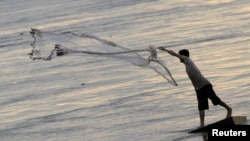HANOI —
As policymakers, activists and academics gather in Hanoi for a regional forum on water, food and energy in the Mekong, some are asking whether recent controversial dam projects show regional cooperation needs to take a different tack.
As a Vietnamese dragon dance opened the Third Mekong Forum on Water, Food and Energy, issues of governance and regional cooperation were introduced as some of the main topics for discussion.
Over the last three years, construction of the Xayaburi dam in Laos has proved one of the most controversial hydropower projects in the region, and tested the credibility of the Mekong River Commission, which represents Vietnam, Cambodia, Laos and Thailand.
Several countries raised concerns the dam could severely impact the fish populations downriver, but construction has still gone ahead.
Hans Guttman, the commission's chief executive officer, said he believes the project showed member countries could discuss difficult issues.
Carl Middleton, a lecturer in International Development Studies at Chulalongkorn University, Bangkok, said he was not sure lessons had been learned, especially when it comes to public participation and consulting people about the impacts of dam projects.
Involving local populations
Last month Laos started building another controversial dam, the Don Sahong.
"The opportunity that cross-border agreements offer is the way of creating channels for responsibility to move across borders easily, it essentially failed in the case of Xayaburi because those mechanisms didn’t facilitate cross-border and the issue of justice got caught up in national territories rather than having a regional justice system. Can things be better for Don Sahong? We’ll have to wait and see," he said.
Forum organizer CGIAR, an international organization that funds research into agricultural crop breeding, hoped a new integrated map of planned and current dam projects in the Mekong would encourage governments to consider the bigger picture when it comes to their impact on communities and the environment.
However, Middleton said while mapping is useful, more needs to be done to include the people whose livelihoods are affected in the decision-making process.
"This is what needs to be discussed, that energy security comes at the expense of other forms of security that come from rivers, like food security and water security so the questions is how do you have more integrated policy making that recognizes the current value that rivers provide while at the same time helping meet everyone’s energy needs at the same time," he said.
Looking for alternatives
Middleton said while countries needed energy for economic development, it was important to think about alternatives to hydropower dams, which displace communities and sacrifice livelihoods.
Middleton said policy makers need to think about how to create policy frameworks that promote different types of energies, not just renewables, that can be met from the demand side that is fairer and more secure. He said the discussion needs to be done in a more public way because, at the moment, energy planning is very closed.
The forum concludes on Thursday.
As a Vietnamese dragon dance opened the Third Mekong Forum on Water, Food and Energy, issues of governance and regional cooperation were introduced as some of the main topics for discussion.
Over the last three years, construction of the Xayaburi dam in Laos has proved one of the most controversial hydropower projects in the region, and tested the credibility of the Mekong River Commission, which represents Vietnam, Cambodia, Laos and Thailand.
Several countries raised concerns the dam could severely impact the fish populations downriver, but construction has still gone ahead.
Hans Guttman, the commission's chief executive officer, said he believes the project showed member countries could discuss difficult issues.
Carl Middleton, a lecturer in International Development Studies at Chulalongkorn University, Bangkok, said he was not sure lessons had been learned, especially when it comes to public participation and consulting people about the impacts of dam projects.
Involving local populations
Last month Laos started building another controversial dam, the Don Sahong.
"The opportunity that cross-border agreements offer is the way of creating channels for responsibility to move across borders easily, it essentially failed in the case of Xayaburi because those mechanisms didn’t facilitate cross-border and the issue of justice got caught up in national territories rather than having a regional justice system. Can things be better for Don Sahong? We’ll have to wait and see," he said.
Forum organizer CGIAR, an international organization that funds research into agricultural crop breeding, hoped a new integrated map of planned and current dam projects in the Mekong would encourage governments to consider the bigger picture when it comes to their impact on communities and the environment.
However, Middleton said while mapping is useful, more needs to be done to include the people whose livelihoods are affected in the decision-making process.
"This is what needs to be discussed, that energy security comes at the expense of other forms of security that come from rivers, like food security and water security so the questions is how do you have more integrated policy making that recognizes the current value that rivers provide while at the same time helping meet everyone’s energy needs at the same time," he said.
Looking for alternatives
Middleton said while countries needed energy for economic development, it was important to think about alternatives to hydropower dams, which displace communities and sacrifice livelihoods.
Middleton said policy makers need to think about how to create policy frameworks that promote different types of energies, not just renewables, that can be met from the demand side that is fairer and more secure. He said the discussion needs to be done in a more public way because, at the moment, energy planning is very closed.
The forum concludes on Thursday.




